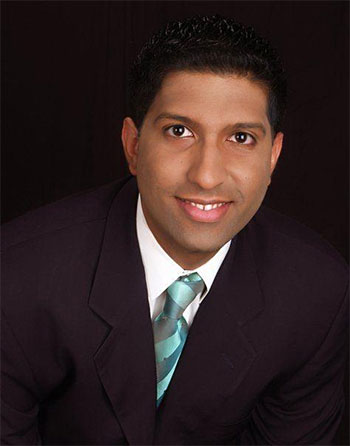Faculty Matters
The Why and What of Sex and Cancer
By Saketh Guntupalli, MD
 (May 201 8) The impetus for Sex and Cancer was a study on
(May 201 8) The impetus for Sex and Cancer was a study on
Completed in 2015, the groundbreaking study is called “Sexual & Marital Dysfunction in Women with Gynecologic Cancer,” which was published in the International Journal of Gynecologic Cancer and presented at the 18th biennial meeting of the International Gynecologic Cancer Society in Lisbon, Portugal in 2016.
The purpose of the study was to put issues related to gynecologic cancer patients and sexual functioning front and center and to unearth some answers that could help other women—and their partners—rediscover and sustain intimacy. It was groundbreaking because no study to date had examined in great detail the effect that gynecologic cancer has on marital and domestic partner relationships.
When we saw the study results, my co-author and I knew we needed to do two things.
First, we felt compelled to tell women who had experienced breast or gynecologic cancers that they had a lot of company if they had big disruptions in their intimate relationships after diagnosis and treatment.
Second, we needed to tell them how to establish a “new normal” in sexual functioning—one that could be even better than before cancer entered their life.
With that latter goal in mind, we interviewed therapists who work with women, and in some cases couples, who have struggled with sexual functioning or just wanted to kick their love life into a higher gear. We also talked with many of my patients and, whenever possible, their partners or spouses.
My co-author, Maryann Karinch, and I knew each other well before starting work on this book. I’m her physician here at UCHealth. We wanted to make that clear so that you know this isn’t “just” a physician and an author teaming up to write a book. This is the deeply personal mission of a team with day-to-day experience—from the perspective of oncologist and patient—of sexual dysfunction after cancer diagnosis and treatment.
We divided the book into two parts, with the first being focused on understanding why cancer and its treatments are bound to affect sexual functioning. There’s no way around the challenges, but understanding the various causes of them will go a long way to helping you use the menu of solutions, which are the focus in the second part of the book.
Our entire discussion in the book on “issues and answers” centers on the study conducted here and carried out at four locations, including two UCHealth facilities, Columbia University Medical Center in New York and Loma Linda University Medical Center, which is about sixty miles east of Los Angeles. We also refer to other complementary studies to give readers a sense of what kinds of test instruments have been used to ascertain the extent to which sexual function or dysfunction occurs in populations affected by cancers of different kinds.
Considered together, the studies helped us get a better understanding of the nature of the dysfunctions and how to address them. They also illuminate how the medical community might avert problems for new patient populations.
When you add to that the contributions of other CU physicians, nurses, and technicians, as well as physical therapists, sex therapists, and other relevant experts, we were able to offer a doable and practical approach to overcoming sexual dysfunction after gynecologic and breast cancers.
Saketh Guntupalli, MD, is an associate professor of obstetrics and gynecology in the Division of Gynecologic Oncology and co-author of Sex and Cancer: Intimacy, Romance, and Love after Diagnosis and Treatment.